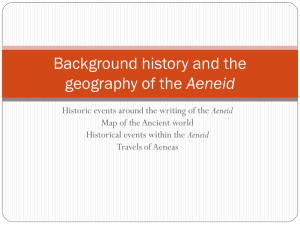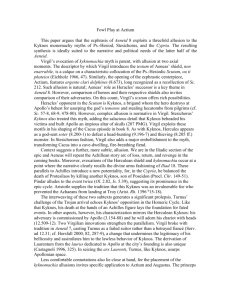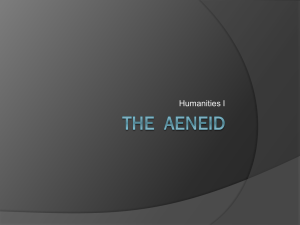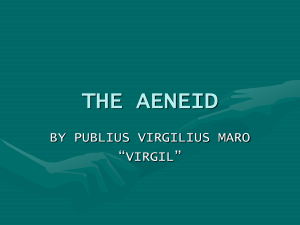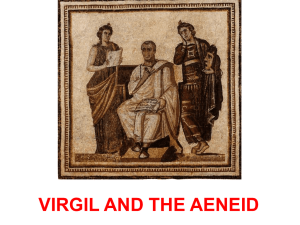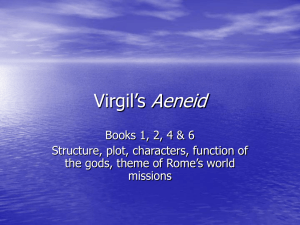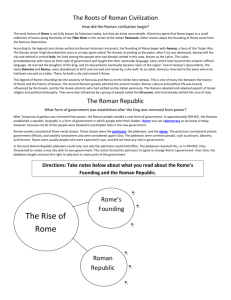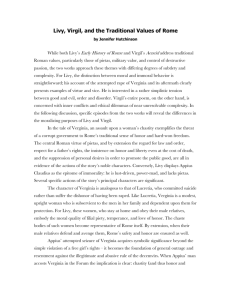2 points each
advertisement
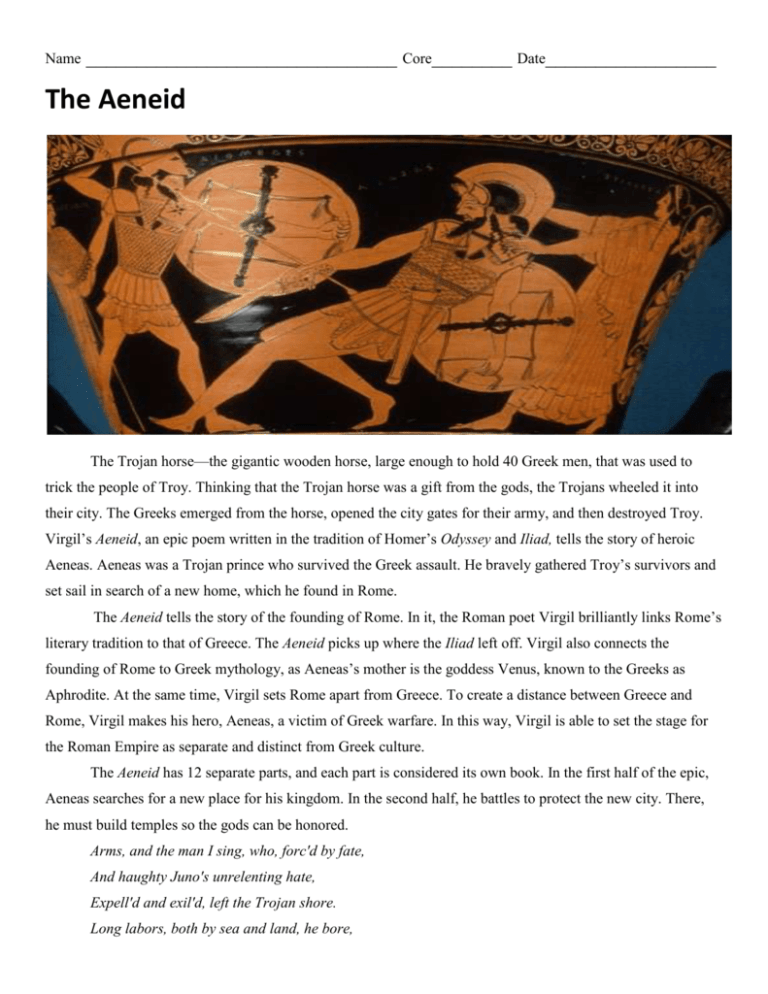
Name _______________________________ Core________ Date_________________ The Aeneid The Trojan horse—the gigantic wooden horse, large enough to hold 40 Greek men, that was used to trick the people of Troy. Thinking that the Trojan horse was a gift from the gods, the Trojans wheeled it into their city. The Greeks emerged from the horse, opened the city gates for their army, and then destroyed Troy. Virgil’s Aeneid, an epic poem written in the tradition of Homer’s Odyssey and Iliad, tells the story of heroic Aeneas. Aeneas was a Trojan prince who survived the Greek assault. He bravely gathered Troy’s survivors and set sail in search of a new home, which he found in Rome. The Aeneid tells the story of the founding of Rome. In it, the Roman poet Virgil brilliantly links Rome’s literary tradition to that of Greece. The Aeneid picks up where the Iliad left off. Virgil also connects the founding of Rome to Greek mythology, as Aeneas’s mother is the goddess Venus, known to the Greeks as Aphrodite. At the same time, Virgil sets Rome apart from Greece. To create a distance between Greece and Rome, Virgil makes his hero, Aeneas, a victim of Greek warfare. In this way, Virgil is able to set the stage for the Roman Empire as separate and distinct from Greek culture. The Aeneid has 12 separate parts, and each part is considered its own book. In the first half of the epic, Aeneas searches for a new place for his kingdom. In the second half, he battles to protect the new city. There, he must build temples so the gods can be honored. Arms, and the man I sing, who, forc'd by fate, And haughty Juno's unrelenting hate, Expell'd and exil'd, left the Trojan shore. Long labors, both by sea and land, he bore, And in the doubtful war, before he won The Latian realm, and built the destin'd town; His banish'd gods restor'd to rites divine, And settled sure succession in his line, From whence the race of Alban fathers come, And the long glories of majestic Rome. (book 1, stanza 1, lines 1–10) This passage is the introduction. It summarizes the story of the Aeneid in just ten lines. Though he is not yet named, the hero is saved so that he can bring the gods to a new place in Italy. Juno is the ancient Roman goddess of hearth and home. In Greece she is known as Hera. Juno does not like the hero Aeneas because of his role in an ancient prophecy, or prediction, that says her favorite city will be destroyed. Because of her interference, the Trojans sail for years before they find the lands of Latian, or Italy. Aeneas eventually builds the town the gods had promised him and becomes the first in a line of great kings of the Roman Empire. Virgil uses the first stanza to give a quick summary of the story, and then describes the history of Rome in greater detail throughout the story. Because it was written well after Rome was founded and in a time when the empire was flourishing, all Romans knew how it ended because they already knew the history of Rome. Still, readers would have enjoyed the poem for its description of battles and love. It is not until Book 6 that Aeneas reaches Italy: Their anchors dropp'd, his crew the vessels moor. They turn their heads to sea, their sterns to land, And greet with greedy joy th' Italian strand. (book 6, stanza 1, lines 3–5) After reaching Italy, Aeneas has many adventures. Aeneas sees his first glimpse at the later line of kings of Rome when he visits his father in the afterlife. Aeneas visits the Elysium Fields, which in Roman mythology is a bit like heaven. His father tells him about the future kings of Rome: Now fix your sight, and stand intent, to see Your Roman race, and Julian progeny. The mighty Caesar waits his vital hour, Impatient for the world, and grasps his promis'd pow'r. But next behold the youth of form divine, Caesar himself, exalted in his line; Augustus, promis'd oft, and long foretold, Sent to the realm that Saturn rul'd of old; Born to restore a better age of gold. Afric and India shall his pow'r obey; He shall extend his propagated sway Beyond the solar year, without the starry way. . . . (book 6, stanza 28, lines 1–12) By explaining the future kings of Rome, Virgil establishes a history for the reader and makes it seem like the story is true. Virgil, however, is writing from the time of Caesar Augustus. Through his poem, Virgil claims that Augustus is the promised ruler, sent to restore Rome to a “better age of gold,” or the Golden Age. Halfway through the poem, Virgil reminds the reader that Aeneas’s destiny is really Rome’s success. The poem is a record of the gods’ plan unfolding through history. Book 9 of the Aeneid explains the line of kings in ancient Rome and gives readers a historical context for the poem. The Trojan War occurred about 1220 BCE, but there are no signs of an advanced civilization in Rome until much later. Rome itself was founded about 750 BCE. This means that there is a large gap in time for Aeneas to be sailing around the Mediterranean. To fill this gap of time, Virgil addresses the other story of the founding of Rome that his readers would have already known, the legend of Romulus and Remus. The legend says that twin male babies are abandoned by their parents and placed into a basket to float down the Tiber River. A wolf finds the babies and nurses them until a shepherd finds them. When the boys become adults, they want to build a city where the wolf had saved them. They argue over where the wolf found them, however. In anger, Romulus kills his brother and builds the city where he wants it. He names the city after himself: Rome. This legend was popular and believed by many Romans when Virgil was alive. Instead of ignoring the story, Virgil works it into his poem. Aeneas is given a shield by Vulcan, the god of blacksmithing, to protect him in battle. The shield has scenes from the future Rome on it, including its founding by Romulus and Remus. Readers in ancient Rome would have identified the popular legend in Virgil’s writing and might have believed that Aeneas was the true founder of the Roman civilization. What Virgil did was give Romans an invented history. Invented histories can overtake the real history of a place, and in this case, Virgil’s invented history works to give Romans a sense of loyalty. By appealing to Romans’ love of the Romulus and Remus story, Virgil helps Romans identify with the Aeneid. The epic poem ends with a great battle, from which Aeneas emerges the victor. There is no happy ending given to the hero, however. The civilization carries on, and the readers are left to imagine that what comes next is what already has happened: their own history. In the end, the Aeneid does more than explain how Rome was founded. The story also helps Roman people understand themselves. __________________________________________________________________________________________ Questions Multiple Choice: (2 points each) 1. What is one reason that Aeneas’s voyage from Troy to Italy takes a long time? A. He must care for his young son. B. He does not know the way to Italy. C. He is slowed by the goddess Juno. D. He forgets to give thanks to Venus. 2. Why does Virgil include the lineage of Roman kings in the Aeneid? A. to show how educated he is B. to link his story with the history of Rome C. to show the demise of Greece’s kings D. to encourage Caesar Augustus to pay for his work. 3. In what way does Virgil use the Romulus and Remus story in the Aeneid? A. He states that the story is true. B. He included scenes from this story on Aeneas’s shield. C. He includes a stanza in which Aeneas battles Romulus and Remus. D. He rewrites the story and replaces Romulus with Aeneas. Short Answer (8 points) The Aeneid includes some clearly fictional elements, like babies being raised by wolves. Why do you think that Virgil included a mixture of fiction and actual history in his poem? What do you think he was trying to accomplish? Use details from the passage in your answer.
